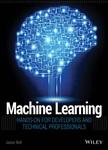版权所有:内蒙古大学图书馆 技术提供:维普资讯• 智图
内蒙古自治区呼和浩特市赛罕区大学西街235号 邮编: 010021

版本说明:1
I S B N:(纸本) 9781118889060
出 版 社:Wiley
出 版 年:2014年
页 数:407页
主 题 词:Machine Learning: Hands-On for Developers and Technical Professionals Jason Bell big data techniques big data technology data mining data analysis data analysis algorithms knowledge discovery artificial intelligence machine learning help machine learning tutorial machine learning handbook machine learning guide machine learning examples machine learning code machine learning applications machine learning techniques machine learning languages machine learning algorithms real time machine learning data visualization machine learning revolution machine learning for developers
学科分类:02[经济学] 0202[经济学-应用经济学] 020208[经济学-统计学] 07[理学] 08[工学] 0714[理学-统计学(可授理学、经济学学位)] 0835[工学-软件工程] 070103[理学-概率论与数理统计] 0701[理学-数学] 081202[工学-计算机软件与理论] 0812[工学-计算机科学与技术(可授工学、理学学位)]
摘 要:Dig deep into the data with a hands-on guide to machine learning Machine Learning: Hands-On for Developers and Technical Professionals provides hands-on instruction and fully-coded working examples for the most common machine learning techniques used by developers and technical professionals. The book contains a breakdown of each ML variant, explaining how it works and how it is used within certain industries, allowing readers to incorporate the presented techniques into their own work as they follow along. A core tenant of machine learning is a strong focus on data preparation, and a full exploration of the various types of learning algorithms illustrates how the proper tools can help any developer extract information and insights from existing data. The book includes a full complement of Instructor s Materials to facilitate use in the classroom, making this resource useful for students and as a professional reference. At its core, machine learning is a mathematical, algorithm-based technology that forms the basis of historical data mining and modern big data science. Scientific analysis of big data requires a working knowledge of machine learning, which forms predictions based on known properties learned from training data. Machine Learning is an accessible, comprehensive guide for the non-mathematician, providing clear guidance that allows readers to: Learn the languages of machine learning including Hadoop, Mahout, and Weka Understand decision trees, Bayesian networks, and artificial neural networks Implement Association Rule, Real Time, and Batch learning Develop a strategic plan for safe, effective, and efficient machine learning By learning to construct a system that can learn from data, readers can increase their utility across industries. Machine learning sits at the core of deep dive data analysis and visualization, which is increasingly in demand as companies discover the goldmine hiding in their existing data. For the tech professional involved in data